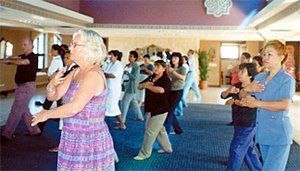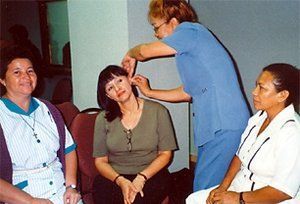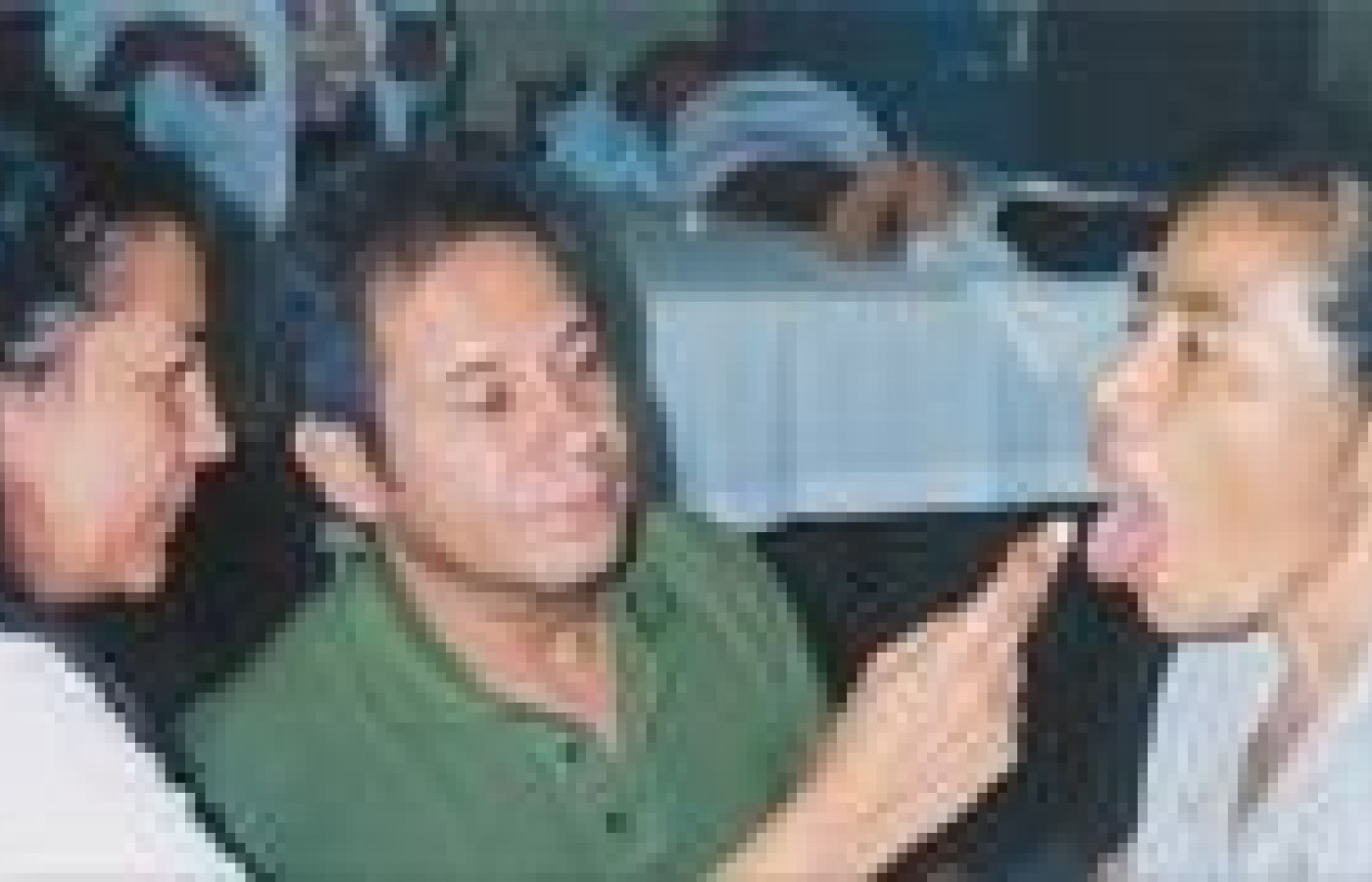The most important relationship I seek to nurture in the treatment room is the one a patient has with their own body. We live in a culture that teaches us to override pain, defer to outside authority, and push through discomfort. Patients often arrive hoping I can “fix” them, but the truth is, we can’t do the work for them. We can offer guidance, insight and support, but healing requires their full participation.
Update on the Honduras Healing Recovery Project
It is most gratifying to report that the Honduras Healing Recovery Project (HHRP) will return to Honduras for the fifth time in October 2003. This time, we will bring more advanced training and skills in auricular therapy to the public - allopathic physicians, nurses, naturopaths and psychotherapists who have been working with us since our first trip in 1999. It may be remembered from previous reports that teams of acupuncturists and psychologists from the U.S. treated the traumatized population of Honduras after Hurricane Mitch devastated the country in 1998 (editor's note: click to read the article online). On the initial trip, we trained the Honduran public health practitioners in the NADA five-needle protocol to treat posttraumatic stress disorder (PTSD). This was the first time this protocol was used to treat PTSD. On subsequent trips, those practitioners continued to request that we teach them further advanced techniques in auricular therapy, along with other aspects of Chinese medicine such as qigong, meditation practices and acupressure methods. With these techniques, they were able to treat many different health conditions, and the techniques were found effective in treating conditions where allopathic medicine was not very effective, or where medicines were unavailable. On our last trip in October 2002, the program had essentially become self-sustainable, which was the project's original goal and mission.

The people we have trained have continued to return and are more actively involved; they help select future participants, team-teach with us, and now conduct some of the additional courses on their own. They continue to follow their own philosophical model, which includes a commitment to apply their training to community services. One allopathic physician has started an open community clinic in one of the afflicted areas and, as he said to us on the last trip, he essentially now uses only acupuncture, which he has proceeded to study on his own. Some of the other physicians also have reported successful treatments of many conditions, such as allergies, high blood pressure and asthma. Two nurses have opened clinics in their respective neighborhoods and feel particularly satisfied to be living out their passion to help others; they now treat various conditions for which auricular therapy is very effective.

On the last trip, we treated many coffee pickers what lived in the same community. The coffee syndicate would bring the community members to their central offices in Tegucigalpa, where we treated them. Toward the end of our trip, we received an invitation to visit the community. As a result, we have been invited to work in that particular community, San Juancito, for one week. The nurses we trained there also have arranged that we travel to the Caribbean coast and train a new group, as this is an area of the country in which we have not yet worked. This is a community where the public health authorities have been lax in providing services; many Garifunas live there and are afflicted with multiple ailments. They migrated from Africa in their own boats, and are one of the few groups of ethnic blacks that have never been enslaved.
As in past years, the biggest problem for HHRP has been in receiving funds, even though we continue to be under the auspices of AVANTA, the nonprofit organization that has managed the funds for the project. Last year, even though we had a matching funds grant, we were barely able to meet it. Problems included the fact that most private foundations still consider us "experimental." Acupuncture schools, organizations and private donors experienced a financial squeeze. However, it is important to note the creativity of some of our acupuncture volunteers, who gave classes or presentations in their respective communities in fields such as astrology, and prepared meals featuring regional cuisine to their personal friends in order to raise money. Our herbal and medical supply donors made it possible to return. Had it not been for their most generous contributions we would not be able to get there. Our gratitude is due to ITM; Crane; Helio; OMS; Electromedical Products International; Kenshin; and the Electro Medical Company. We also had some wonderful book donations in Spanish from Terry Oleson and Harriet Beinfeld.
We continue to incorporate cross-cultural factors whenever we present our form of Asian medicine. When possible, we present the similarities in world views and medical cosmology between the native Honduran medicine and Chinese cosmology, respecting both medical traditions.
The importance of having a bilingual group of acupuncture volunteers experienced in both clinical and teaching skills demonstrates the importance of teaching adults with appropriate methodologies in carrying forth this particular type of self-sustainable project.
My many personal contacts in Honduras, my country of origin, facilitated the cross-cultural communication and also helped us gain access to the right sources and facilities. Personal contact is an invaluable asset that makes this project work as well as it has. A local Honduran doctor, who has given HHRP a lot of moral support, described what I believe is most important in considering a self-sustainable project in these types of communities. He eloquently stated: "Health is promoted through the participation of the various social sectors in the community: indigenous; ethnic; campesinos; workers; students; small businesses, civic and religious organizations. It can be obtained through the organized efforts that transform societal structure processes generated by hegemonic powers. It is reflected in the dominant economic, political, cultural, and military powers, as manifested in the loss of cultural identity, and diminishing self-determination; hunger; poverty; sickness; and the violation of human rights." Honduras continues to be an extremely poor country in need of most basic needs.

I want to acknowledge our current group of medical acupuncture volunteers who will be joining me once again for this upcoming trip, and providing free medical treatments and teaching: Anna Osuna, LAc (WA), Della Estrada, LAc (AZ), Pamela Brady, LAc (VT) and Rusty Klobas, LAc (ME). Other acupuncturists who volunteered their services in previous trips, and who made valuable and unselfish contributions include David Krofcheck of Michigan; Julia Raneri of Washington; Daniel Bruce of New Mexico; Leticia Reyes of California; and Jose Roberto Laguna of Texas. There are, however, many other acupuncture colleagues who have given much support, particularly Mike Smith, MD; Carol Taub, LAc; Elizabeth Goldblatt, LAc; Barbara Mitchell, LAc; Jake Fratkin, LAc; Steve Meeker, PA; and Tom Corbin, PA, who took many hours from their busy schedules to give needed advice. There are, of course, many people and friends who contributed financially and with valuable suggestions, and for that I am forever grateful. Muchas gracias.
Some suggestions have been presented in this article for those considering projects of this nature. The future of the Honduran participants of HHRP is very uncertain, but hopeful; the personal rewards that we have all benefited from as acupuncture volunteers in carrying out this type of mission cannot be properly expressed except to say that it brings a tremendous sense of satisfaction.
For further inquiries, call (520) 469-7473 or e-mail me at the address below. Thank you for your support.



